It is 5:15AM. Whitehall Pennsylvania is quiet. Snow blankets the ground, as it has for most of the winter. There is no traffic, car or foot. I suppose I might hear the trucks lumbering down MacArthur Road, the main thoroughfare through the township, less than a quarter mile away, if I stuck my head outside, but it’s February and it’s cold, and my task today is not to listen for traffic, but to get fifteen minutes to talk with David Beedle, author of the new book, Punk Party and Other Accounts of Mischief, a collection of novellas and short stories.
It’s not an easy interview to get. Beedle is a busy man these days, hunkered down with his family, carving out time to work on his next writing project, repairing a hole in the drywall in the living room ceiling, and undertaking what he calls “the most embarrassing, cringe-inducing, difficult parts of writing a book.” Selling it.
Beedle doesn’t want to be bothered. He says he’s not a salesman and he’d rather be in his writing room alone, making stuff up, instead of talking with me … yet it was Beedle who invited me here, as part of what he calls his “Shameless Virtual Book Promotional Tour.” The interview would turn out to be much more confessional than either of us planned.
After pointing to a spot on the ceiling where the hole in the drywall used to be, and then a few introductory pleasantries, Beedle pours me an americano (he’s on his second) and we sit in his living room to hash through the Punk Party book writing and book publishing experience. “Let’s get this over with,” he says with a sigh. And I have to say, I agree with him. After all, he is me. I am him. When you’re a self-publishing one-man-band, you’ve got to generate your own buzz—as painful as it is.
My name is David Beedle, and this is my interview with David Beedle.

Question: You look older than I expected.
Answer: That’s not really a question, is it?
Q: Let me try again. Now that you and I are here, face to face, do I look older than you expected?
A: You look ancient. Look at the lines on your face. And your hair, it’s white. Completely drained of color. And you look tired. You need to get more sleep. Do I look as bad as you?
Q: Sadly, yes. And you are right about the sleep. What do you do when you can’t sleep?
A: I find old TV shows to serve as quiet background noise. Anything without music. Old films on Turner Classic Movies, old gameshows on the Buzzer Network … Bob Ross always does the trick. Also PBS cooking shows. Cooks Country and America’s Test Kitchen put me straight out. I love those shows.
Q: Enough of this jibber-jabber. I’d like to step through each of the five stories that make up your new book, and really dig deep—
A: Let’s not give away the farm—
Q: I’ll start with Punk Party. This is really about you. It’s your story. Well you and your dopey friends.
A: They are my best friends in the world, thank you, and yes, it started out as an exercise to document a few of the nutty experiences my friends and I had over a fleeting period in the early 1980s. I’ve tried for thirty years to get something down on paper about those years, and it has always been a miserable failure. The result always read like a horribly embarrassing diary entry. Then I tried again … one last time … and found the secret ingredient: Lies. I had to make stuff up to tell the real story I wanted to tell. As is always the case, as soon as the story became fictional I was set free.
Q: There was no Punk Party then?
A: Oh, there was one. And it was pretty crazy. And a few things that happened at the real Punk Party are in the book, as are things that happened at all the other parties we through at the Hockey House—
Q: So there was a Hockey House?
A: You keep interrupting.
Q: Sorry.
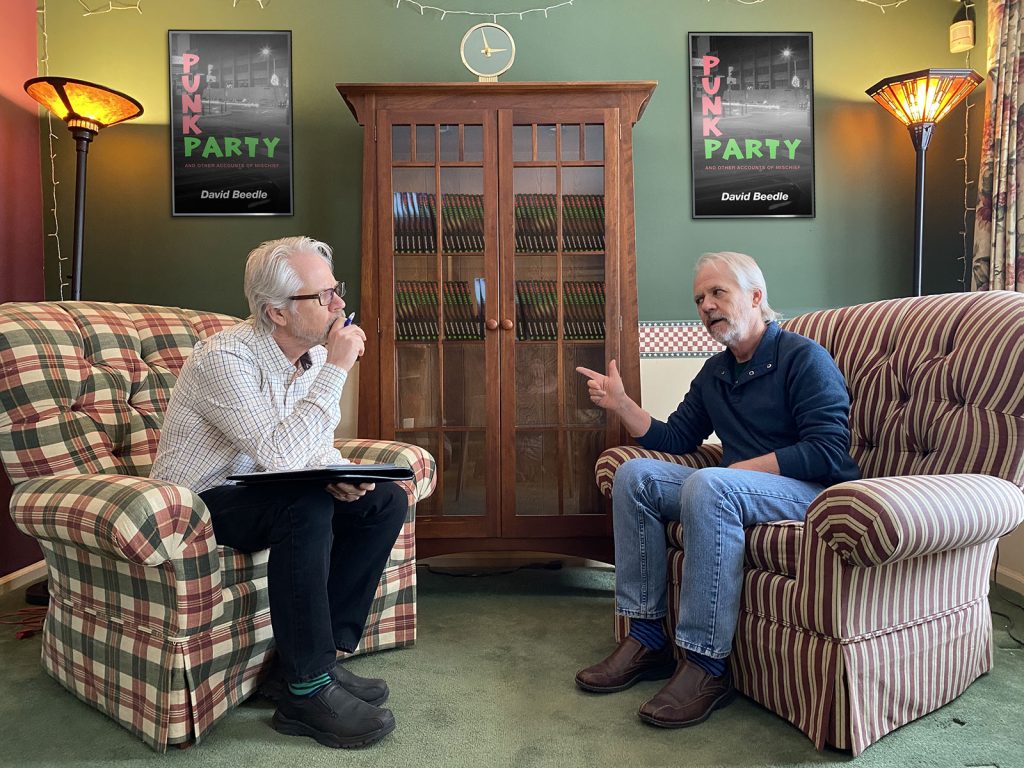
A: Yes, there was a Hockey House. Look, the point is, my life in 1984 was a jumping off point for the story. But my life in 1984 wasn’t much to write about, so once I started exaggerating and making stuff up—only then did I feel like I had something.
Q: And what about the real people upon which the characters in Punk Party are based? Do you think they’ll recognize themselves? What do you think their reactions will be after reading your book?
A: You mean if they read it. I honestly can’t wrap my head around anyone wanting to read my drivel.
Q: You’re quite an insecure fellow.
A: Right again. I think insecurity is part of the job description of being a writer. Anyway, I hope that if they read it they get just the tiniest reminder of what it was like back in those early days … that they recognize what’s true and what isn’t … and that I love them all. But really, your question about “what will they think about the book” is the essence of a writer’s—or really any creative person’s—existence.
Q: This should be good. Tell me more.
A: Don’t be a wise guy, and just write this down on your little pad of paper. I haven’t learned much over the past six decades, because I, like many humans, seem to make the same mistakes over and over again. However, there is one fact that I have learned to accept. We are all constantly being judged. I think it’s especially true of people who have chosen to follow some kind of creative endeavor as their occupation.
Q: How so?

A: I’ve always thought I had some kind of talent when it came to writing. Art was nurtured by my parents and runs strong, like the Force, in my family.
[Editor’s note: At this point, Beedle asks that I strike the line about “the Force,” saying it was only a joke, and that there is no way he has some kind of Jedi-like skills when it comes to writing, but I decided to keep it in to embarrass and torment him.]
There are painters, musicians, designers, performers, and writers in my family. We do it because we are drawn to it, and then we discover that we may even have developed a certain flair. And then comes a moment in the process where we get visceral pleasure in our art. That’s the high point for me. When I’m in the middle of a story and I’m in the zone and the story is writing itself … and in that moment I am sure am making magic. It’s undeniable. I am convinced that what I am creating is very good.
Q: And then?
A: And then comes the misery. Then comes the moment when I think: “Other people should read this.”
Q: What’s wrong with that?
A: What’s wrong with it is that once I’m out of the zone, then all confidence that I’ve somehow created some stupendous work of art is gone. Out the window. Then, later on, it returns and I’m back on track. Then it’s gone again, but by now it’s too late. I’m on this treadmill, chasing the pure joy of believing I am an artist. Put “artist” in italics when you write this, okay? [Editors note: Done.]
But like I said, once I get that little spark that I think something is good … it’s too late. I’ve somehow made this decision I have no control over: “Other people should read this.” That’s why I started my blog. That’s why I’m searching for agents to publish my novel, Bottleneck, and that’s why I decided to self-publish this collection of stories. The problem is that it has set off this other set of tasks and consequences of which I want no part.
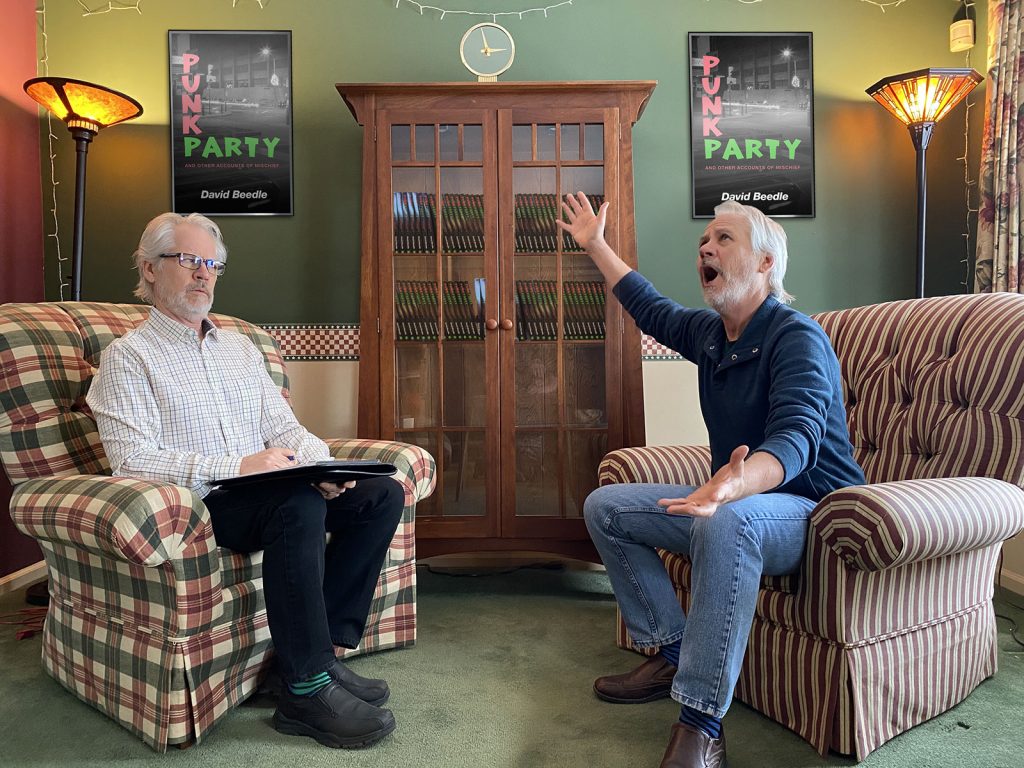
Q: And what tasks and consequences are those?
A: Well, the big task is selling myself. Convincing people to spend actual money to buy my book. Making social media posts and book trailers and blog posts—
Q: Like this one—
A: —that try to convince people that Punk Party and Other Accounts of Mischief will be everything I say it is in the blurb on the back of the book. I’ll tell you one thing, writing a 300 page book is way easier than two paragraphs on the back cover.
Q: You sound a little bit messed up in the head.
A: I didn’t even get to the “consequences” of writing a book: The judging.
Q: Ah, yes the judging. I understand that. I’ll be judged for how well I did interviewing you.
A: That’s right, David.
Q: Thank you, David.
A: And I’ll be judged on stories that started as something as innocent as “this is an idea that might be fun to write about.” And you need to know that when I start writing a story, I never know how it’s going to end. Sometimes I only know the ending until after I’ve written it and then I realize, “Oh. It’s over.” And now someone might read my book and they’ll think, “Why did this happen?” “Why would this character do that?” “Why would somebody write about this?” Or the worst response of them all: “Really? That’s it?”
Q: Come on, you don’t know that—
A: Oh yes I do. I recently read a book … a classic … and after I was done I thought, “Really? That’s it?” So yeah, it’s absolutely going to happen because if a schlub like me is going to have that reaction after reading one of the 100 greatest novels of all time, what chance does my little book have?
Q: You need to let it go.
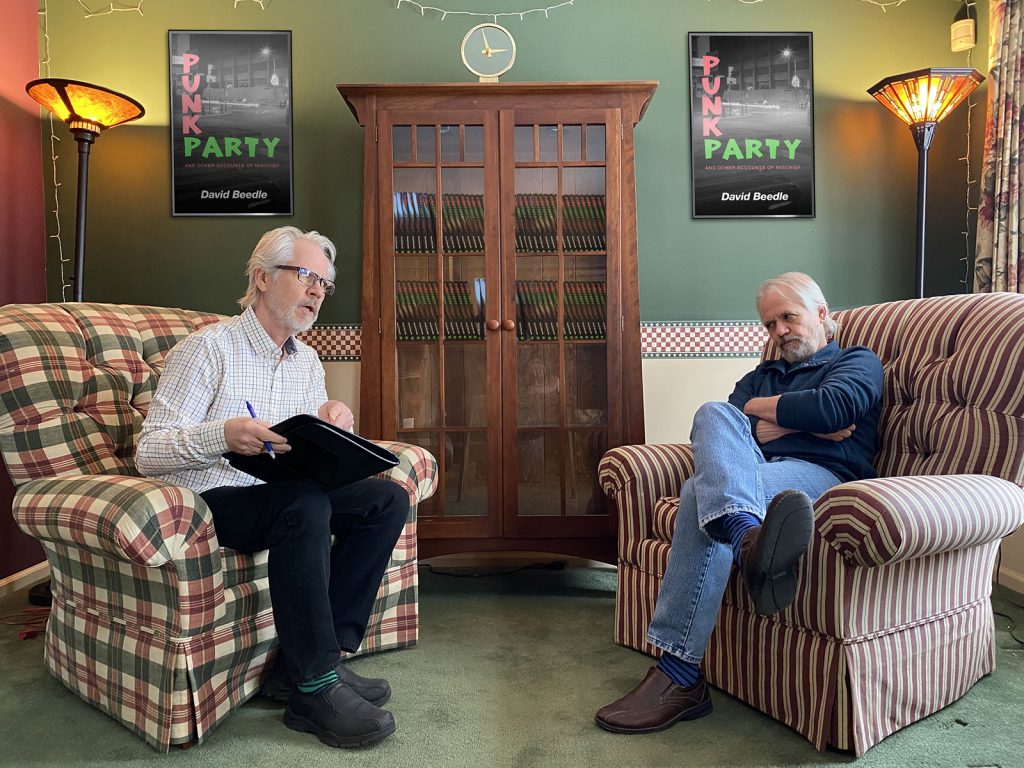
A: I have let it go, believe it or not. I’m actually quite used to being judged. In my other life as a video editor and animator, my work is judged on a daily basis by clients and peers and coworkers. I’ve learned to embrace it, and understand that it’s not judging. It’s feedback. It’s constructive. It’s something that may make my work even stronger. That’s why I want to publish my novel Bottleneck traditionally. To work with an agent, an editor, and a publisher after my first draft is a dream of mine, because I’ve seen how my work can improved through the collaborative process.
Can I just add one final note about being “creative?”
Q: It’s your blog post.
A: Creativity is not the purview of the “obvious” creative arts. [Editor’s note: Beedle does the annoying finger quote gesture when he says “obvious.” And by the way, did he just use the word “purview” in a sentence? Who does he think he is?] Anyone who takes on something … and develops a love for it … is creative. People just don’t label it the same way. You can’t tell me that being an engineer, or a salesperson, or carpenter, or an administrator, or an accountant, or an athlete does not fall under the realm of creativity.
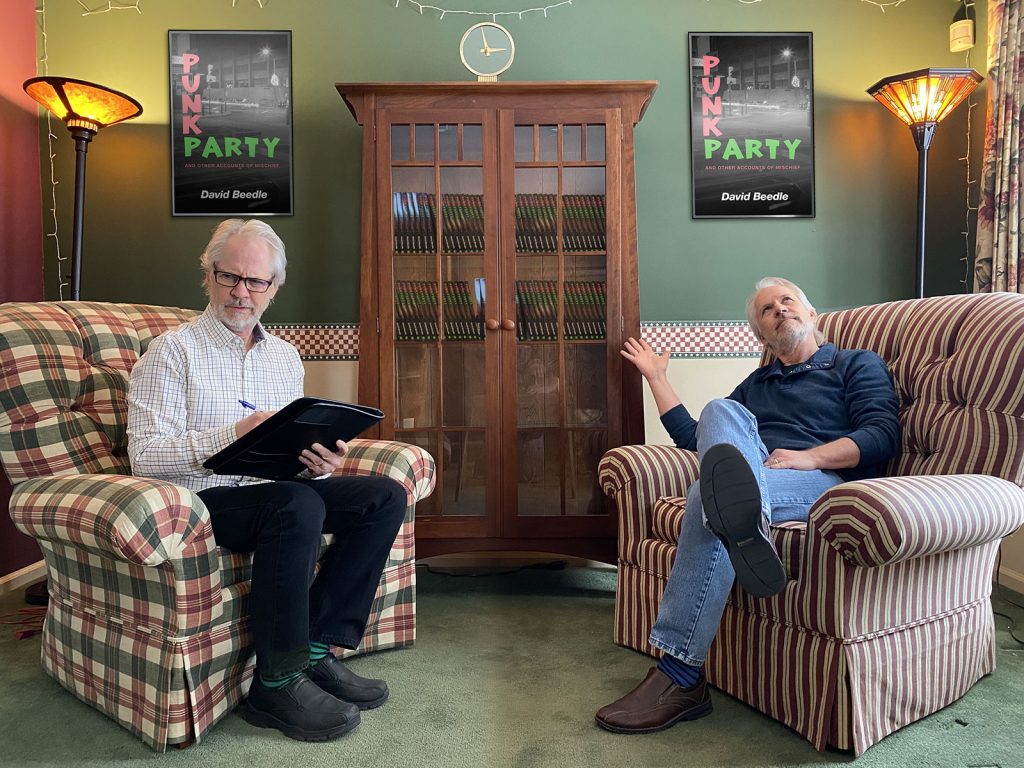
Q: That’s heavy man. Let’s get back to the other stories in your book. I mean, you’re here to sell yourself, right? That’s what this “Shameless Virtual Book Promotional Tour” is all about.
A: Right you are. Bit Player is my attempt to write a Twilight Zone episode. In fact I wrote the very first draft in screenplay format to help me get it started. It’s a different kind of story for me. There are several bad guys in Bit Player and I have difficulty writing bad guys. I want everyone to be nice and every character to be happy. But that makes for boring books. So writing Bit Player helped me find my inner bad guy.
Q: The Man Who Never Had an Original Idea—
A: —is very short, and if I described it in any detail here, all would be given away. I will say this: As you may decipher from the title, and from this interview so far, I often feel as though I am the title character of that story.
Q: And the last two stories?
A: The last two stories are about Police Detective Johnny Sidney and his partner, Lanier. Johnny Sidney and Lanier are my Sherlock Holmes and Watson, only silly. Lanier is the storyteller. The first story was written back in the late 1980s and produced as an audio play for a school project. I re-listened to it not long ago and thought it would be fun to do that again. A sequel. Quickly I realized actually producing another audio play would take way too long, so I wrote it as a short story. I loved rediscovering Lanier, thirty-five years later.
Q: We’re running out of time, so I’m going to rattle off some questions and would like very short answers.
A: Go.
Q: What are your expectations for this, your first book?
A: I have none. I just want to get it out there. A real, printed book. If I sold twenty books I’d be happy. But really, selling books is not the objective.
Q: I’m going to need shorter answers. Name some of your influences.
A: Tom Wolfe’s The Bonfire of the Vanities is the greatest book ever written. I love Stephen King, Larry McMurtry. I recently read The Goldfinch by Donna Tartt and loved it. I just finished Kurt Vonnegut’s Slaughterhouse Five and it was devastating. The use of the phrase “so it goes” throughout that book was the undoing of me.
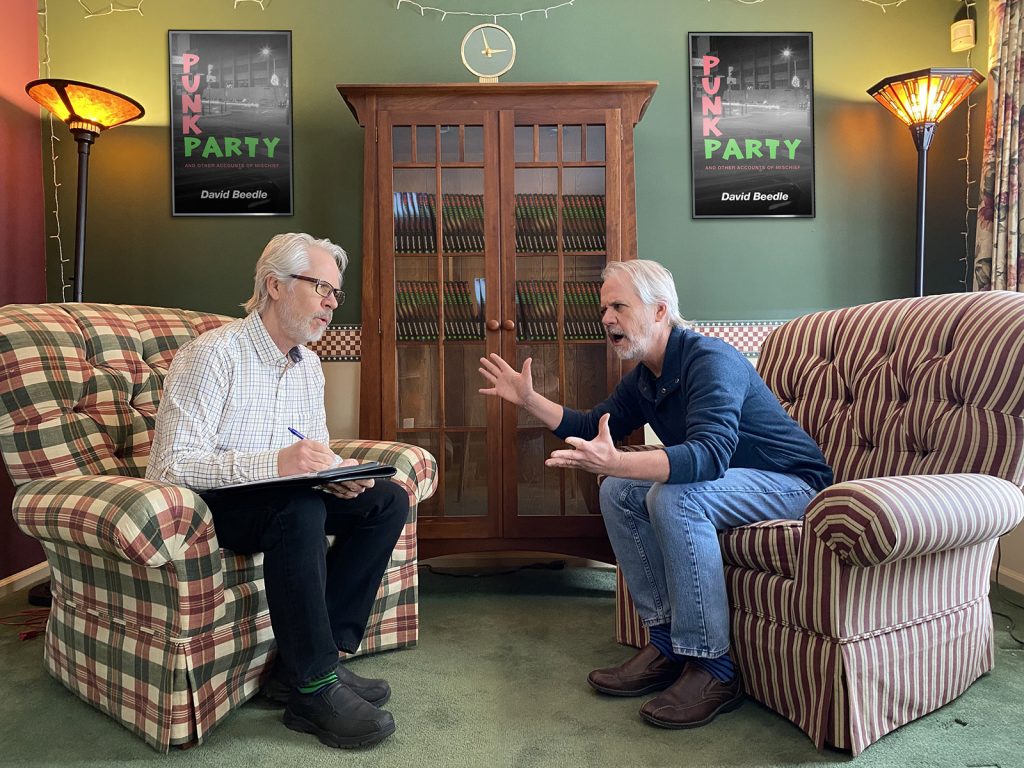
Q: What’s your writing routine?
A: I try to be at my computer by 5AM every day and put in two-to-three hours of writing until I need to transition to my other life. During the weekends I try to write until noon. Lately weekends have been spent on creating book trailers and the other elements of my Shameless Virtual Book Promotional Tour, like this ridiculous interview.
Q: What is it you don’t understand about the phrase, “short answers?” Next question: What’s next for you?
A: Earlier I mentioned a novel I’ve written called Bottleneck. I like it. I finished it a few years ago, but didn’t get any bites with agents. I re-read it not long ago and I can see why. Even though I still like it, it has “first-time novelist” written all over every page.
Q: That’s too bad.
A: Yeah. I need to go back and erase “first-time novelist” off of every page.
Q: What’s one thing people don’t know about you?
A: I had a pain in the eye the other day and thought I might go blind. It passed.
Q: How many Twitter followers do you have?
A: Last time I looked I had seventy-seven. So, basically none. After my book is released my goal is to not lose followers. That’s the dream.
Q: What makes you so special?
A: Once people start thinking like that it’s the beginning of the end.
Q: What’s the most exciting thing about publishing your first book?
A: That people will finally be able to read my work.
Q: What’s the scariest thing about publishing your first book?
A: That people will finally be able to read my work.
Punk Party and Other Accounts of Mischief is published through BookBaby and will be released on March 26, 2021. It is available for pre-order now at Amazon, Barnes & Noble, and the BookBaby Bookshop.
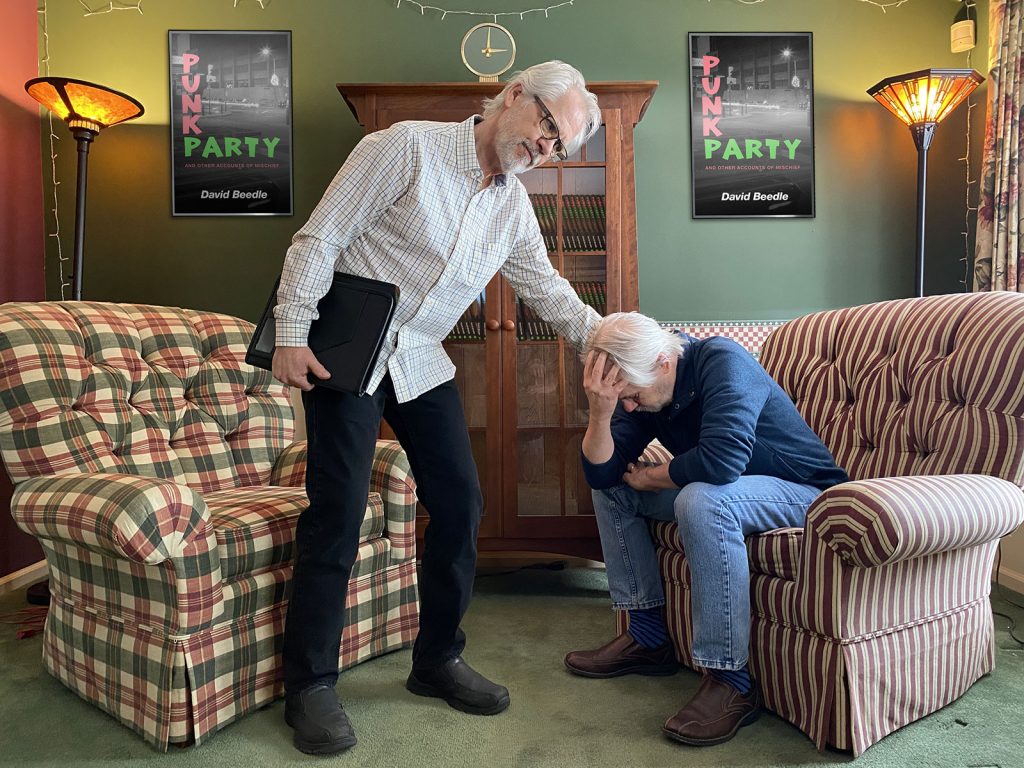

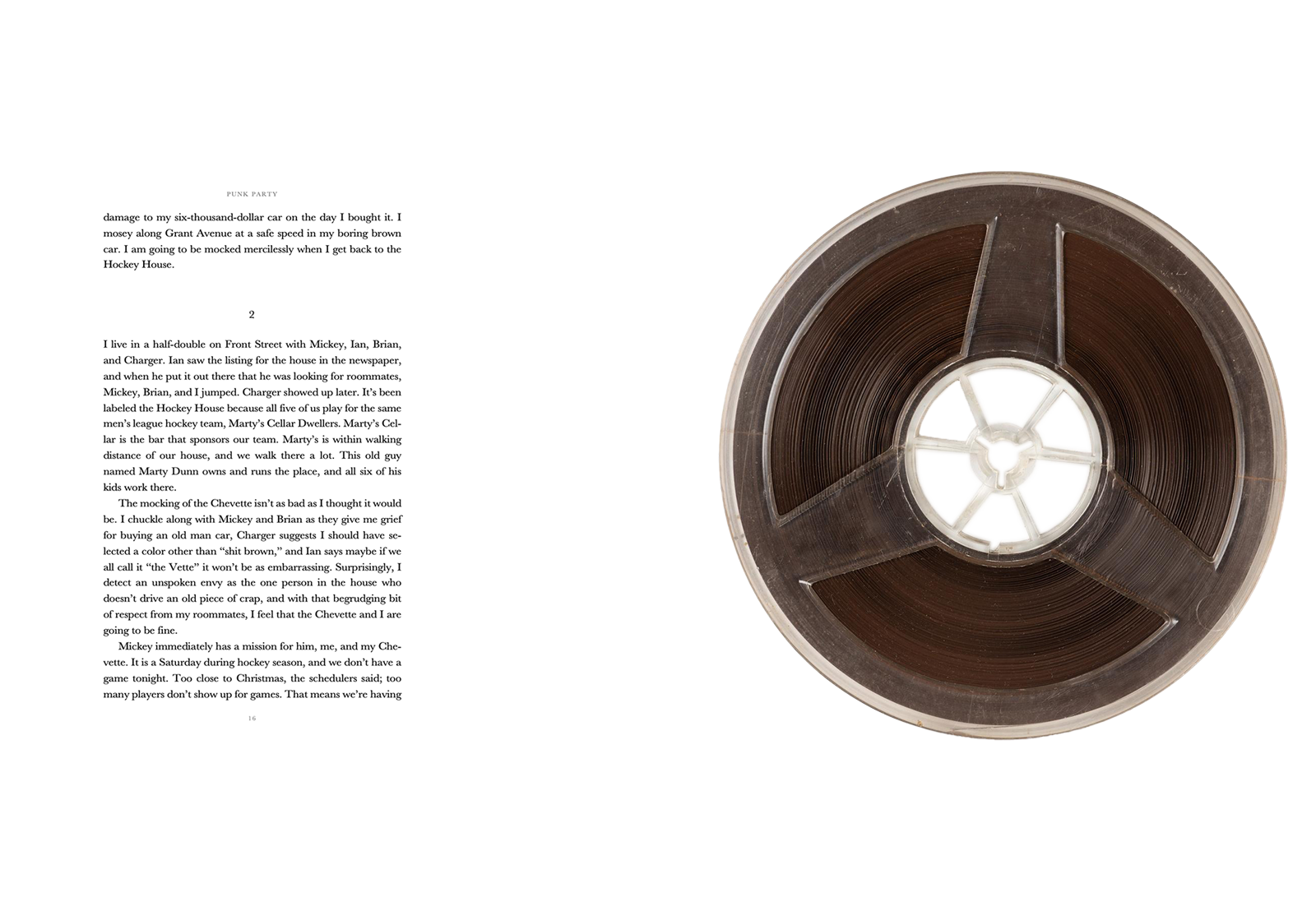
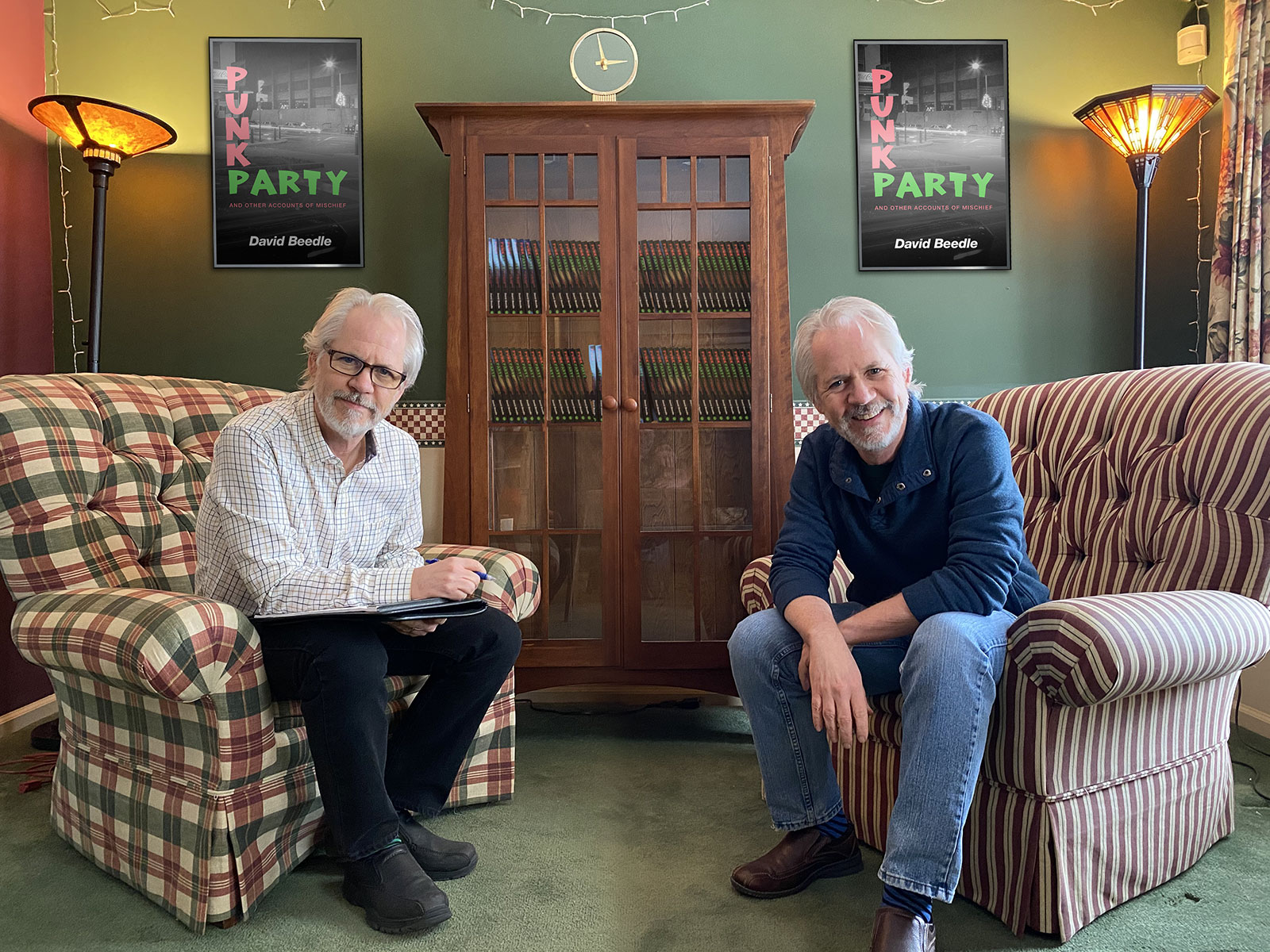
Oh man… that was a great read! Did I say I loved the pictures?
Davids, totally heavy, very heavy. I had a problem like this once, but with therapy, drugs, and a lot of amperage I was able to get through it. Can’t wait for the book to come out so I can have you sign it! Did you say the book release party is at Stahley’s? How fitting.
That was delightfully hilarious, David! I am really looking forward to reading Punk Party…..
I just reserved Slaughterhouse Five from our county library. “So it goes”” reminds me of the poem your mom gave Helen, “Just Keep A-Goin’.”
Lotsa love to you and your family!
Beth
This is great ! Anxious to get the book!
Just not sure which David Beedle I like best😉
I thought I was in an episode of “the Parent Trap” or the movie “Twins” ?????
I am starting to lose interest in this book thing! Taking way to long!
I love the book, the author and the (self) interview! The photos are hilarious! Let’s start celebrating now!
David, that was so good!! And so funny and completely engrossing. As you can see, I can’t put a sentence together. Tough beans, I had to wait to read your blog till 10:40 or so tonight! The two David’s were great, both the photos and the talkers. Really fun to read!
Great stuff David… Julie has already ordered our copies…
Plus Jane and I are planning on arrival gifts for the 9 couples coming to St Croix to celebrate my 60th a year late due to Covid cancelling last year… and going to add “Punk Party and other accounts of Mischief” to our welcome basket… everyone like a good read on the beach…
Edward, I am blown away. Thank you!